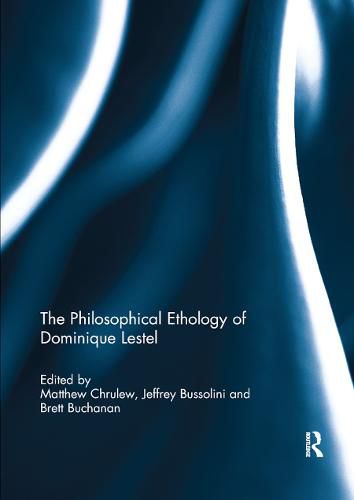Readings Newsletter
Become a Readings Member to make your shopping experience even easier.
Sign in or sign up for free!
You’re not far away from qualifying for FREE standard shipping within Australia
You’ve qualified for FREE standard shipping within Australia
The cart is loading…






Dominique Lestel is a French philosopher whose work is significant for the rethinking of animality and human-animal relations. Throughout such important books as L'Animalite (1996), Les Origines animales de la culture (2001) and L'Animal singulier (2004), he offers a fierce critique of reductive, mechanistic models of animal behaviour, as well as a positive contribution to etho-ethnographic and phenomenological methods for understanding animal life. Centred around hybrid human-animal communities of shared interests, affects and meaning, his critical and speculative approach to the animal sciences offers a vision of animals as acting subjects and bearers of culture, who form their own worlds and transform them in concert with human and other partners. In tracing the ways in which we share our lives with animals in the texture of animality, Lestel’s cutting-edge philosophical ethology also contributes to an overarching philosophical anthropology of the human as the most animal of animals. This book was originally published as a special issue of Angelaki: Journal of the Theoretical Humanities.
$9.00 standard shipping within Australia
FREE standard shipping within Australia for orders over $100.00
Express & International shipping calculated at checkout
Dominique Lestel is a French philosopher whose work is significant for the rethinking of animality and human-animal relations. Throughout such important books as L'Animalite (1996), Les Origines animales de la culture (2001) and L'Animal singulier (2004), he offers a fierce critique of reductive, mechanistic models of animal behaviour, as well as a positive contribution to etho-ethnographic and phenomenological methods for understanding animal life. Centred around hybrid human-animal communities of shared interests, affects and meaning, his critical and speculative approach to the animal sciences offers a vision of animals as acting subjects and bearers of culture, who form their own worlds and transform them in concert with human and other partners. In tracing the ways in which we share our lives with animals in the texture of animality, Lestel’s cutting-edge philosophical ethology also contributes to an overarching philosophical anthropology of the human as the most animal of animals. This book was originally published as a special issue of Angelaki: Journal of the Theoretical Humanities.